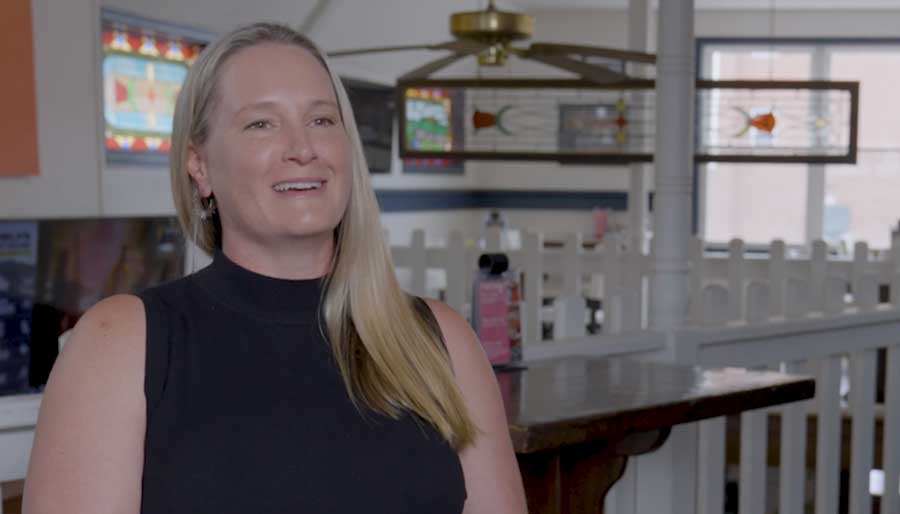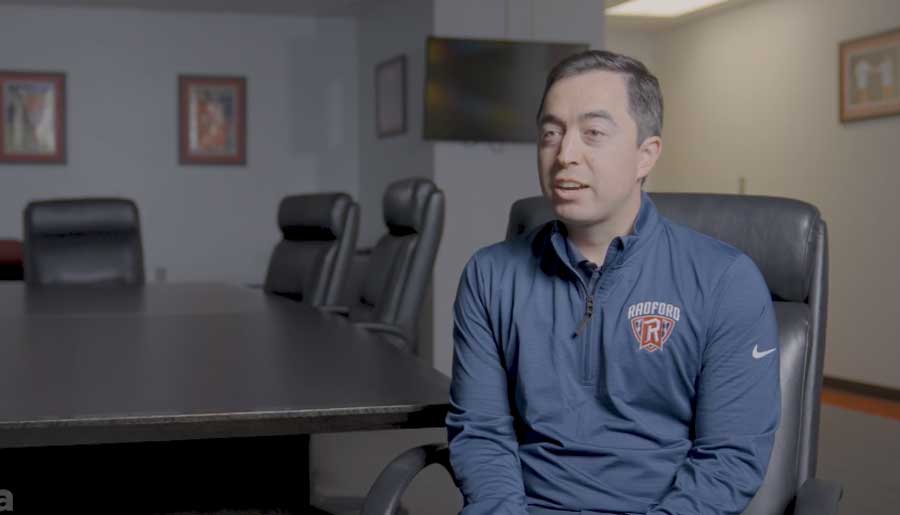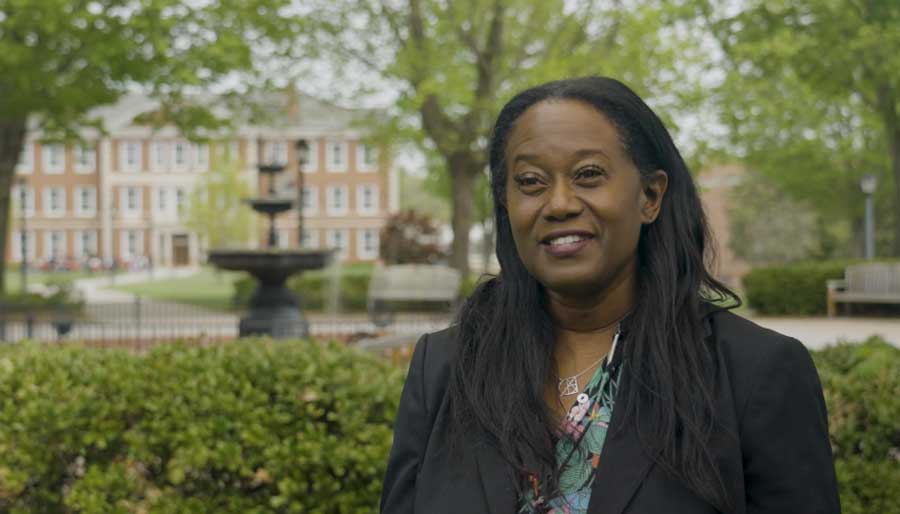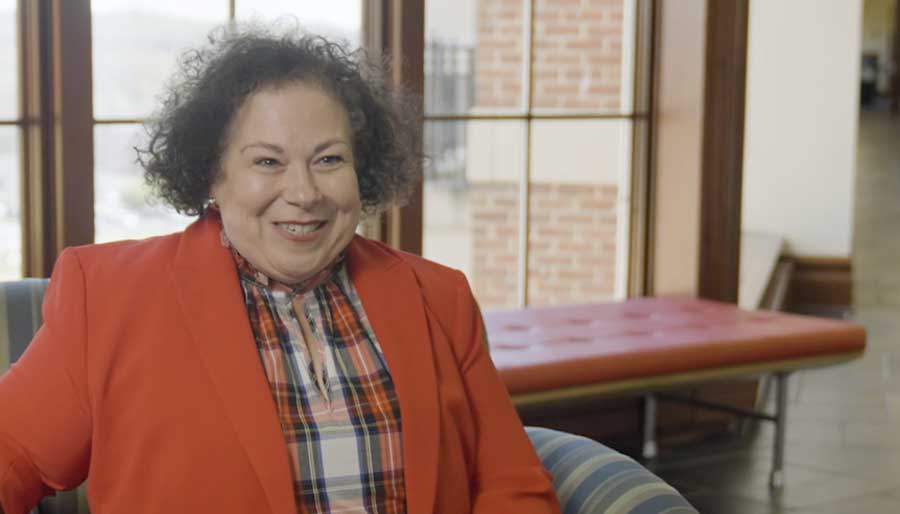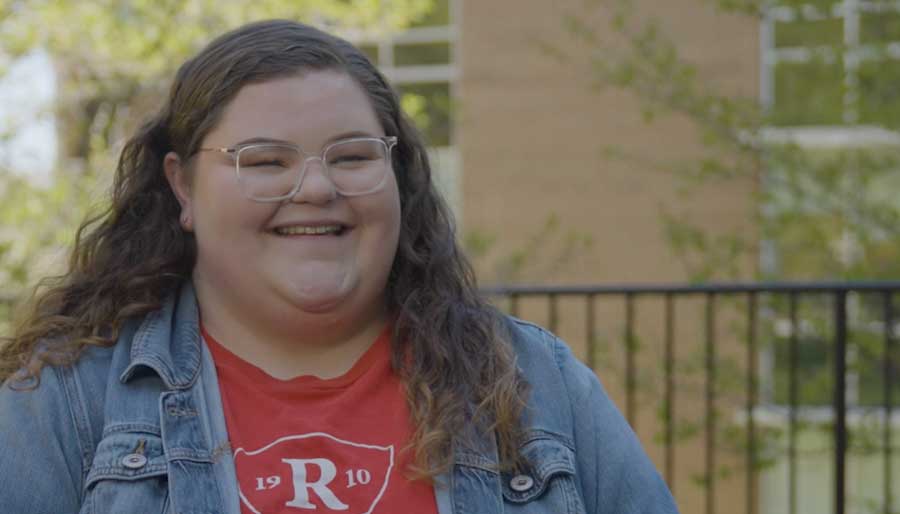Radford University
Serving Our Communities

Community Impact
Supporting the City of Radford and Beyond
Radford University values our relationship with the city of Radford and surrounding communities, including the region’s welcoming people, wonderful resources and great location in the New River Valley. The university’s students and employees actively contribute to the economic prosperity and social well-being of the city and region.
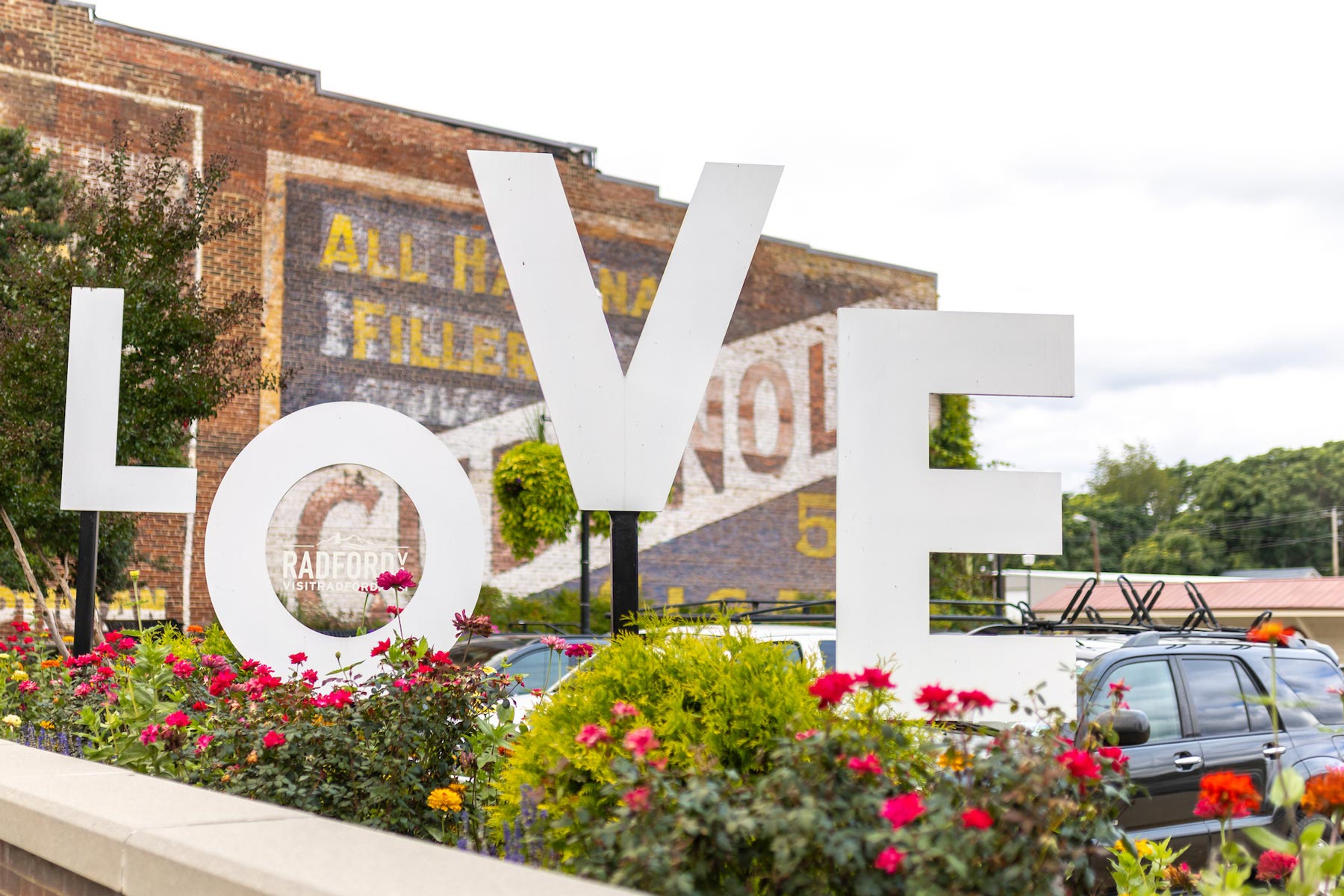
Kelsi Jones chose to stay and serve
Kelsi Jones ’00, BSN ’11, Radford alumna and owner of BT’s, says the restaurant thrives, in part, thanks to its close ties with Radford University. She employs students, welcomes families and believes the town and university succeed by working together as one community.
Community service
Highlanders extend helping hands to communities
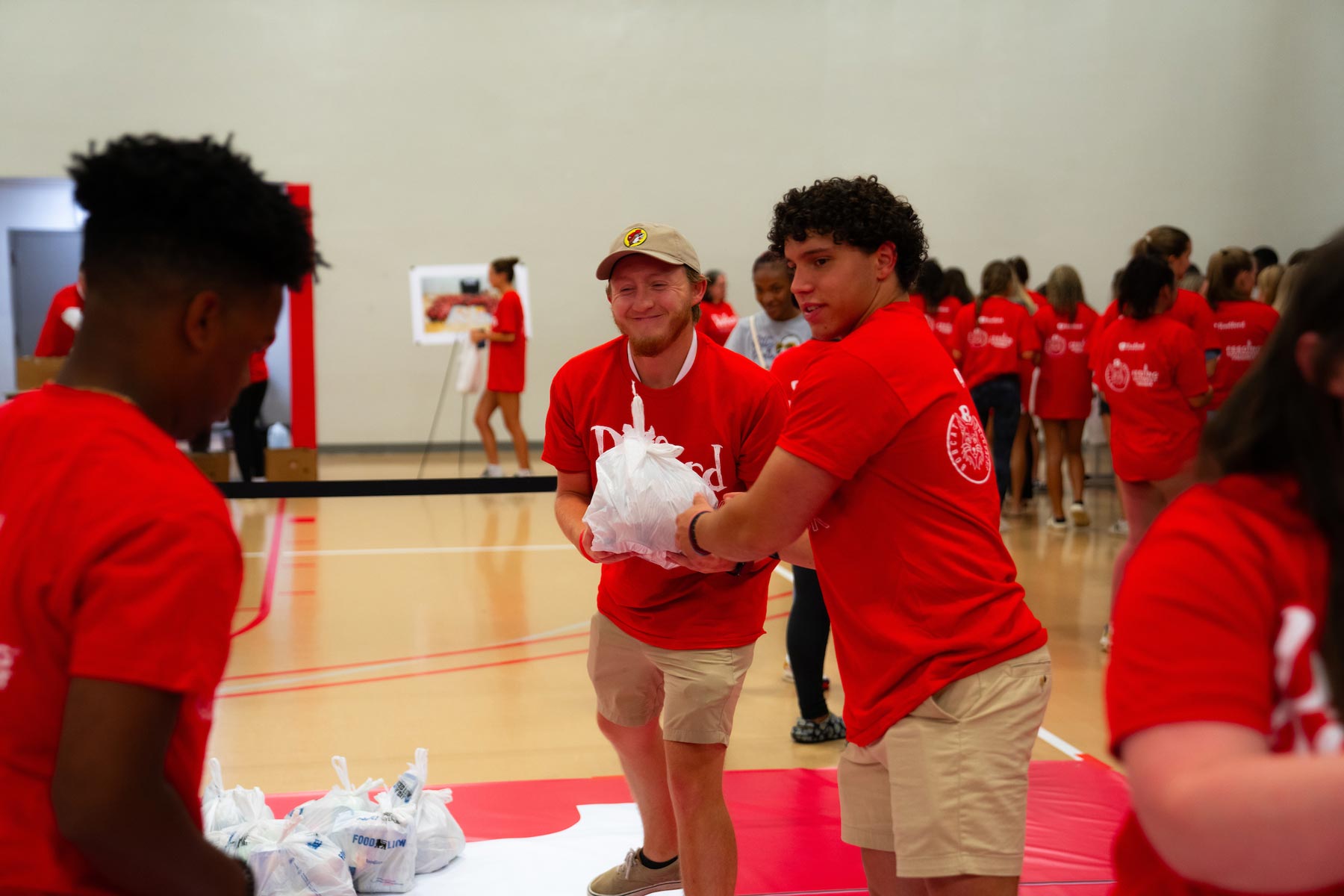
Students across the university perform an annual average of 38,000 hours of community service that benefits residents of Radford, Roanoke and places across the New River Valley.
In 2024, Radford Gives Back celebrated its ninth year of providing nourishment to students enrolled in Radford City Schools through the Bobcat Backpacks program. Organized by alumni and employees and implemented by students, Radford Gives Back has collected more than 87,000 items in its history. The items collected help fill an average of 160 backpacks, distributed weekly.
“I think they get a glimpse of what the community needs,” said Director of Student Involvement Jen Rentschler. “Nothing makes you feel better than knowing what you are doing is making a difference, especially in your own community.”
Additional community service highlights in 2024-25 include:
- Support for New River Conservancy events: Renew the New and The Big Plant
- Establishment of a chapter of the Food Recovery Network, which recovers surplus food from across the supply chain and donates it to local nonprofit organizations
- Spring cleanup of Radford’s Bisset Park, which was significantly impacted by flooding from Tropical Storm Helene in September of 2024.
Students offer residents a less taxing way to file returns
Taxes are inevitable, of course, but three years ago, Radford University began a collaboration between the Davis College of Business and Economics and New River Community Action (NRCA) to provide free tax preparation services to residents.
Since 2022, through the Volunteer Income Tax Assistance (VITA) program, those making less than $56,000 can get their taxes done at no cost to them. VITA has locations in Christiansburg, Floyd and Pulaski, but because the university provides on-campus office space, city residents have gained closer and easier access to the services.
In 2023, VITA’s Radford location prepared 777 tax returns, which, against an average cost of $250, saved the public about $266,000.
It helps the collegiate community as well – that same year, about 100 university students and staffers filed returns using VITA, with much of the processing done by student volunteers who completed 347 returns, thus donating about 220 hours of service.
Taking a fruitful approach to improve community health
Imagine a prescription that provides some of the most fundamental forms of human sustenance – fresh fruits and vegetables.
That’s the concept behind a new effort that’s teaming Radford University with several local organizations to support a “food as medicine” program around the Roanoke and New River valleys.
In November, it was announced that the United States Department of Agriculture (USDA) awarded $479,918 to the Southwest Virginia Produce Prescription Program
(SWPRx), a regional collaboration that includes the Local Environmental Agricultural Project (LEAP), Carilion Clinic, Virginia Fresh Match and Feeding Southwest Virginia, with the university leading the program’s evaluation.
Starting this spring, the three-year initiative will operate in Radford and Roanoke, as well as Floyd and Franklin counties. It should serve about 300 patients who will receive prescriptions for produce while attending nutrition courses.
Local healthcare providers will refer patients who are at risk for or have been diagnosed with high blood pressure, diabetes and pre-diabetes. The goal is to encourage greater consumption of fruits and vegetables among eligible Medicaid patients, to enhance food security and to improve health outcomes.
“The Radford evaluation team will be tracking program delivery processes to learn what works best for the patients, providers, local farmers and community-based food retailers,” said Associate Professor Sallie Beth Johnson, chair of Radford’s Department of Public Health and Healthcare Leadership (PHHL).
Kim Baskette, program director for Radford University Health Sciences graduate programs and an associate professor within PHHL, said the SWPRx “brings together the key players that represent all of the aspects needed to make this a viable and sustainable program for our community members.”
The project is part of the USDA National Institute of Food and Agriculture’s Gus Schumacher Nutrition Incentive Program (GusNIP).
Facilities Management team provides weekend food for children in need
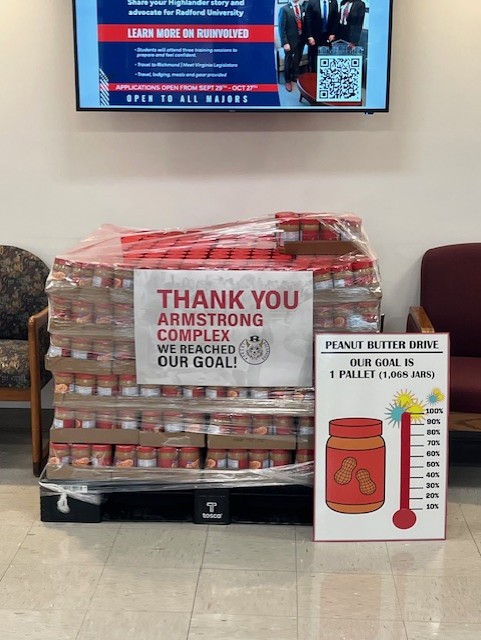
Through the Radford Gives Back effort, Radford University's Facilities Management team raised enough money to purchase 91 cases of peanut butter. That amounts to 1,092 jars for the Bobcat Backpacks Program, which provides weekend food for children in need in Radford City Virginia Schools. This year's effort exceeded the previous effort two years ago, which tallied 89 cases for 1,068 jars. It was a true all-hands-on-deck effort from the Facilities Management team and their great partner, Trevor Bennett, Store Leader at the Fairlawn Kroger.
Where did the idea for peanut butter come from? Two years ago, during Facilities Management's first Radford Gives Back Zoom meeting, the conversation turned to which items were most needed. Neal Thompson, Recycling and Solid Waste Coordinator, asked the simple question: “What’s the number one item?” The answer came back quickly — peanut butter. It’s high in protein, kid-friendly and lasts a long time, making it one of the most valuable items for the Bobcat Backpacks Program.
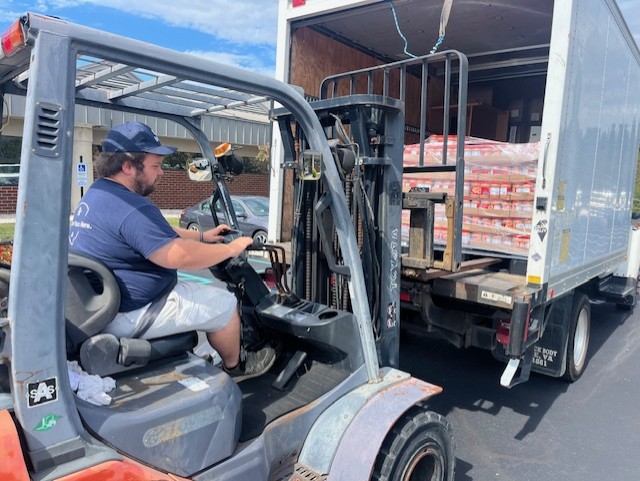
"That answer stuck with me," Thompson said. "I started going store to store around Radford, asking who could give us the best price. Once I found the lowest cost, the Armstrong employees put their trust in me. Instead of each person trying to pick up items on their own, we pooled our money together. By buying in bulk, we stretched our dollars further and delivered a bigger impact than any of us could have managed individually."
What began as a practical choice has now turned into a tradition for the Facilities Management team — one they’re proud of, and one that makes a real difference for local children.
Zach Chu believes in Radford basketball
New head coach Zach Chu is inspired by Radford’s energy, leadership and tradition. Drawn by the university’s vision and strong foundation, he’s committed to building a championship basketball program that reflects Radford’s values and prepares students for lasting success.
Local festivals and events
Radford Community Fest, local outreach deepens connections
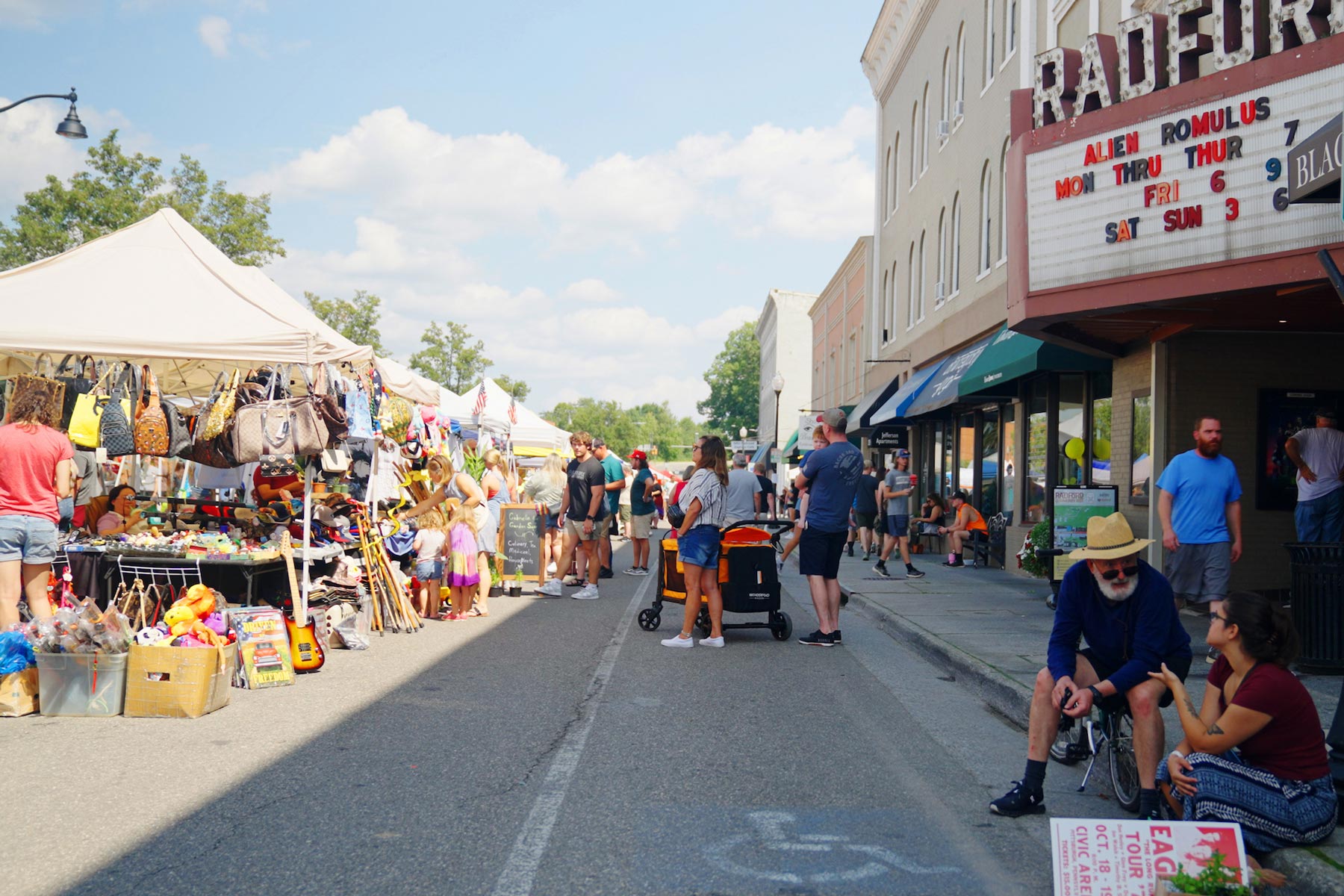
In 2024, Radford University and the city of Radford collaborated to launch an annual signature event, Radford Community Fest. The event is designed as a kickoff for the new academic year and a way to deepen connections between the city, regional residents and business vendors, and Radford students and family members. The inaugural event, held on East Main Street in Radford on Saturday, Aug. 24, attracted thousands of visitors, more than 70 vendors, local performers and over 100 volunteers.
“Community Fest is the start of something bigger,” President Bret Danilowicz said in an on-stage welcome. “Opportunities to bring our community and university together, to celebrate the bonds and shared culture that unite us, will continue to raise the quality of life for all of us. We are one community, and the possibilities are unlimited.”
Community Fest 2025 is scheduled for Aug. 23 and is expected to welcome even more visitors and additional business opportunities.
Highlanders Festival partnership celebrates shared Scots-Irish heritage
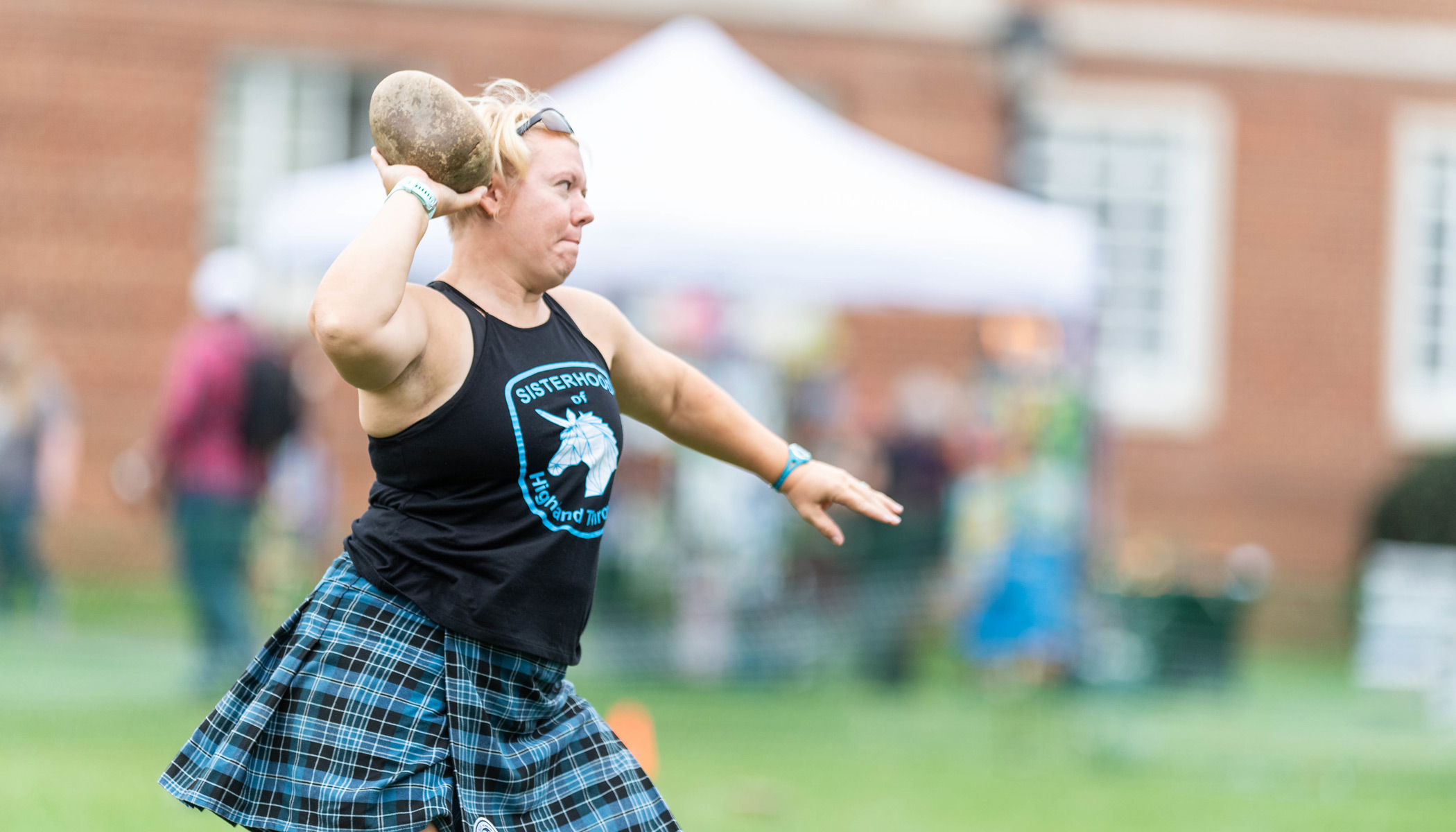
Since its inception in the mid-1990s, the Radford Highlanders Festival has grown into one of the most popular tourist destinations in the region. Presented by Radford University and the City of Radford, the festival has more than tripled in size during the past 25 years and today attracts an estimated crowd of 10,000 people.
Open to the general public with free admission, Highlanders Festival features:
- The famed heavyweight games
- Sheepherding
- Live entertainment
- Food vendors
- Artists, craftspeople and community organization
- Activities for all ages
Angela Joyner invests in the New River Valley
Angela Joyner, Ph.D., highlights Radford University’s commitment to regional growth through downtown revitalization, student engagement and economic development. From enhancing riverfront access to launching the Hub at Radford, the university strengthens connections that help the entire community live, work, learn and thrive.
Summer camps and programs
Boys State of Virginia helps develop tomorrow's leaders
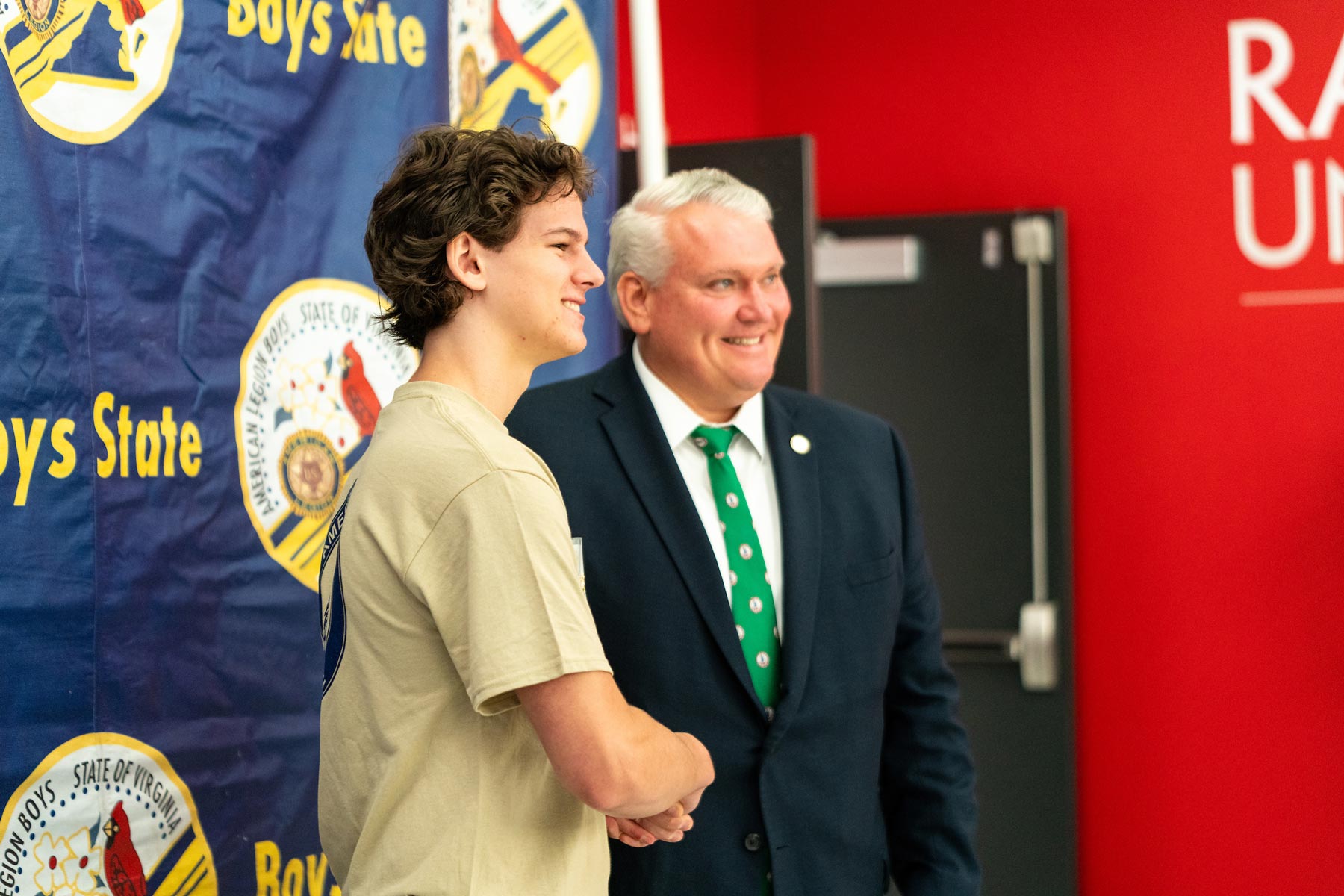
Since 2013, Radford University has welcomed the annual Boys State of Virginia program. During the seven-day event in 2024, Boys State’s “citizens” were grouped into teams identified by fictional town names, and they assembled their own government to support a hypothetical 51st state. They held campaigns and elections for sheriff, mayor and governor, among other offices; created their own platforms, philosophies and legislation; and engaged in activities that range from law enforcement and athletics to performing music and reporting each day’s happenings.
Other functions during the week included College Day, in which the students met with representatives from Radford and other colleges and universities; a talent show; instructional sessions with speakers, including the director for the joint staff for the Virginia National Guard and the secretary of National and Historic Resources; moot court proceedings; American Legion Night with the group’s Department of Virginia Commander Sondra “Sonnie” Dickerson; Hall of Fame presentations; and awards and recognitions for athletics, reporting, moot court, parliamentary procedures, constitutional officers, the best city, Boys Nation and the Dr. George Blume Best Citizens Award.
In 2024, Boys State contributed 2,550 food and paper donations to Radford-Fairlawn Daily Bread.
Summer Bridge and BLAST brings STEM to life
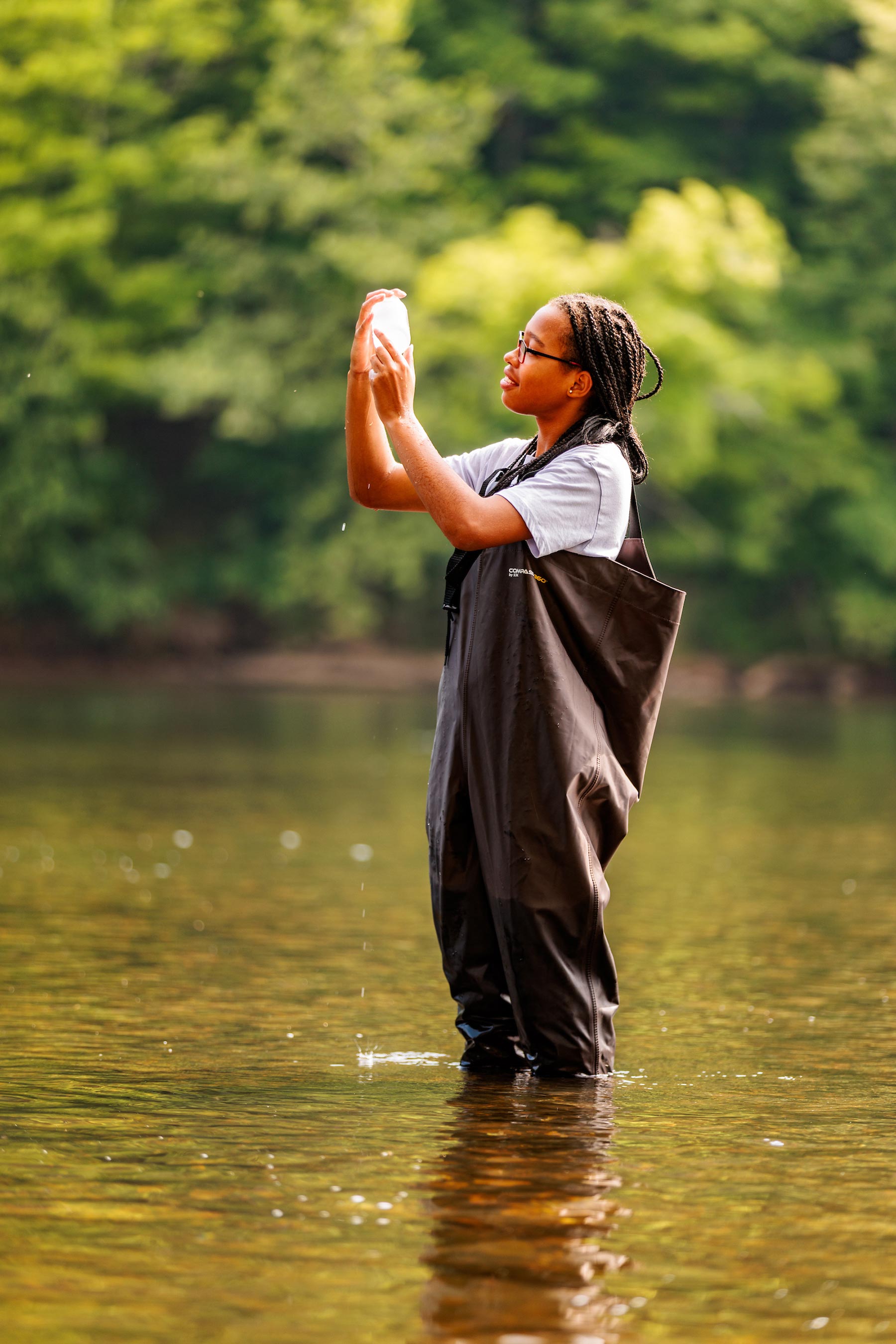
Radford University’s Artis College of Science and Technology offers two outreach programs during the summer for young adults interested in Science, Technology, Engineering and Math (STEM).
Building Leaders for Advancing Science and Technology (BLAST) is a free program designed to help Virginia 8th- and 9th-grade students find their place in STEM. Participants spend three days at a college dorm on the university’s main campus doing hands-on STEM activities. The program is tailored to ignite curiosity and foster interest in students who have a passion for STEM but have not yet had the opportunity to explore it. By offering access to high-quality, immersive STEM experiences, BLAST creates opportunities that may not have been otherwise available, helping students discover and pursue their path in STEM.
Summer Bridge Women in STEM is a week-long residential experience for rising sophomore, junior and senior high school students. Areas of study include Astronomy and Space Exploration, Biochemistry, Biology, Chemistry, Computer Science, Electronics, Geology, Mathematics, Robotics and Unmanned Aerial Vehicles/Drones
Governor’s Schools provide students with high-impact learning
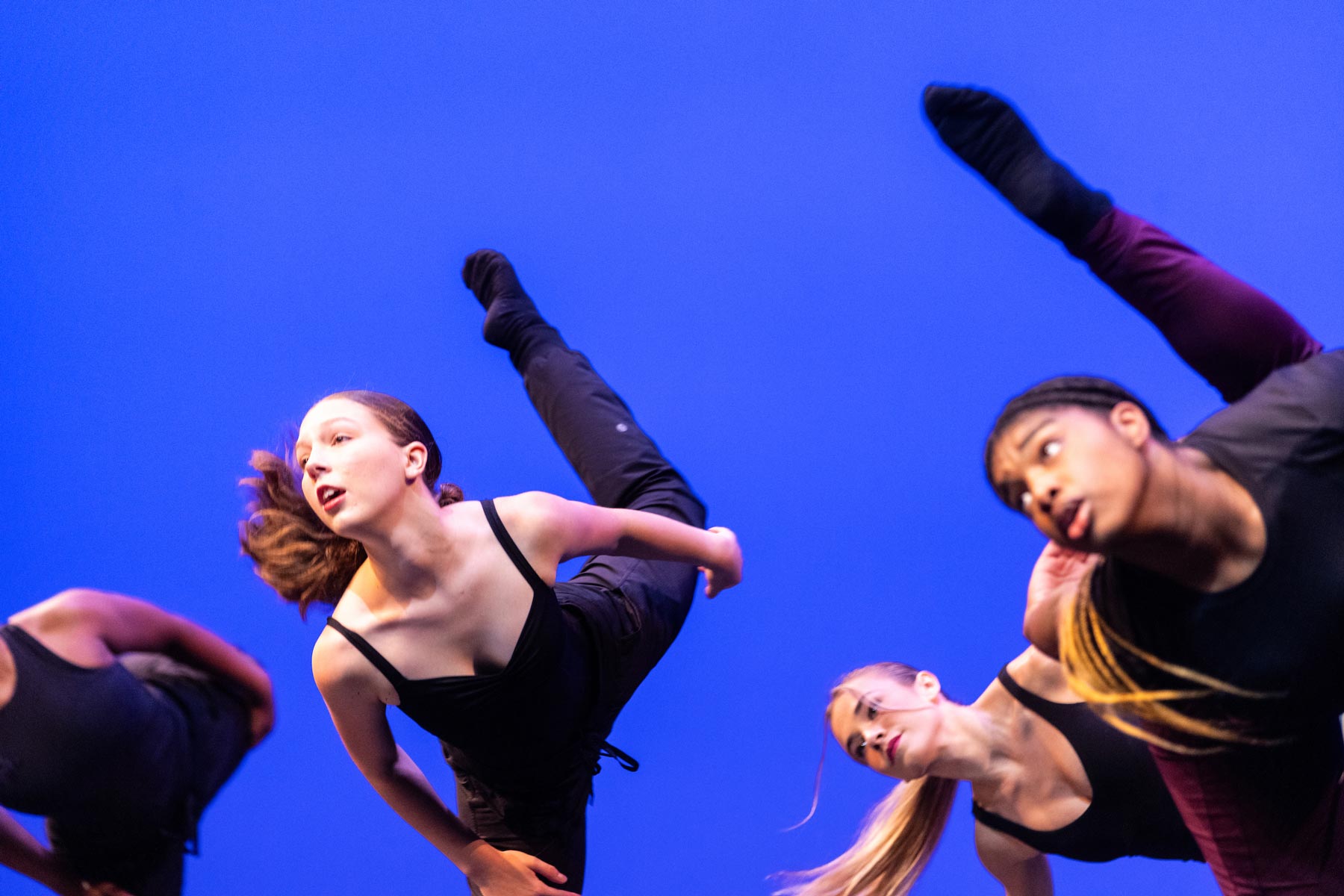
Radford University’s campuses in Radford and Roanoke are home to two summer residential governor’s schools.
On the university’s main campus in Radford, the Governor’s School for Visual and Performing Arts and Humanities serves rising junior and senior high school students by providing impactful and dynamic college learning experiences.
At the Governor’s School for Medicine and Health Sciences in Roanoke, students explore medicine and the health sciences as a foundation for integrated study.
Athletics summer camps designed for youth and aspiring college players
Radford University Athletics offer a range of summer sports camps for youth as well as high school athletes aspiring to play in college. Led by members of the Radford Athletics coaching staff, camps are offered in softball, women's lacrosse, women's basketball and women's soccer, as well as volleyball, baseball, men's basketball and men's soccer.
Donna McCloskey found her dream role at Radford
Dean Donna McCloskey, Ph.D., found her professional home at Radford University. She highlights the Davis College’s global accreditation, strong community ties and stunning setting, where top-tier business education and vibrant local engagement come together in a student-focused environment.
Collaboration with local residents, businesses
The HUB at Radford connects university with local residents, businesses
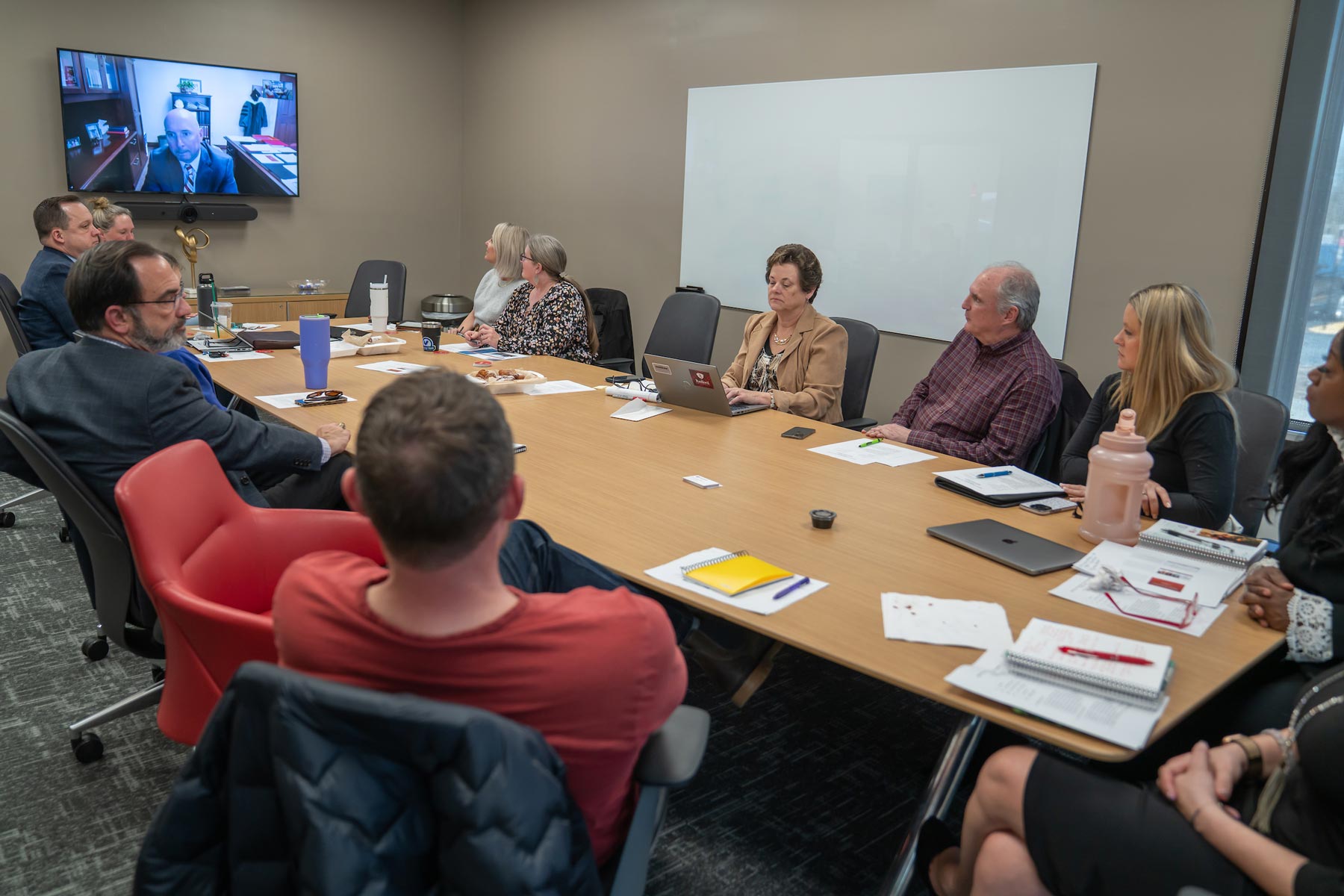
Located at 1000 E. Main St. In Radford, The HUB is conveniently positioned within walking distance to campus, restaurants, coffee shops and public transit. Radford University has launched several new programs and resources in The HUB to serve the surrounding community, including the Certification Center and a new coworking space—CoWorks@The HUB.
Through the Certification Center, Radford University provides a convenient and professional setting for certification and licensure exams for residents in the city of Radford and the counties of Montgomery (including Blacksburg and Christiansburg), Pulaski, Floyd and Giles.
An authorized Pearson VUE testing center, the Certification Center is designed to help individuals enhance their marketability and advance their careers. It provides a range of industry-recognized certification and licensure exams in the areas of IT (CompTIA, Cisco, Microsoft), Healthcare (Nurse Aide Certification, Emergency Medical Technician), Human Resources (Certified Professional in Talent Development), and Business and Accounting (CPA, CRMA, CIA, FPAC).
CoWorks@The HUB is a 12,000-square-foot facility designed to house creativity, collaboration and innovation among freelancers, startups, remote workers and small businesses, while connecting them to university resources and student talent. It is ideal for professionals who want connectivity to downtown Radford and university partnerships.
CoWorks offers flexible membership options ranging from daily passes to private offices. Members enjoy access seven days a week from 6 a.m. to 11 p.m., with amenities that include high-speed internet, meeting room time, mailbox service, printing and copying allowances, coffee, shared kitchen access and parking. Members are also encouraged to engage with Radford students through internships and class projects—creating meaningful opportunities for both professional and academic development.
Partnership to redevelop historic Radford Foundry
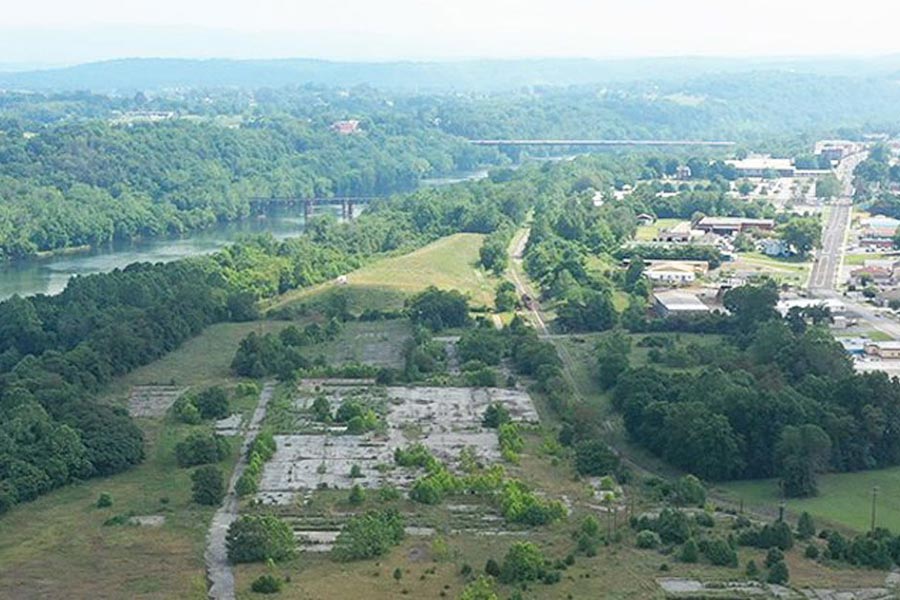
Through a grant awarded to Radford University in 2024, students investigated redevelopment possibilities for the historic Radford Foundry site, a key industrial property acquired by the city of Radford in 2023.
The Appalachian Regional Commission (ARC) generously supplied the funding to participate in the Appalachian Collegiate Research Initiative (ACRI). The $8,000 grant award will support the projects, with $2,000 specifically designated for use by the city.
Two course-based projects, one within the Honors College and the other housed in Appalachian Studies, allowed students to work with the city’s Department of Economic Development to assess potential future uses of the former foundry site. The property, which once housed the Radford Iron and Coal Company, is now a priority for revitalization, with plans to transform the 80-acre site into the West Radford Commerce Park, a multiuse space combining business, recreation, and green spaces.
Students explored a variety of facets of the redevelopment process, including historical research, community interviews, and comparative studies of similar post-industrial projects across Appalachia. The aim is to develop proposals for sustainable, community-focused development that reflects the city’s needs and cultural heritage.
The partnership with the city was facilitated through the Radford University Division of Economic Development and Corporate Education.
Collaborating with designer to reimagine downtown Radford spaces
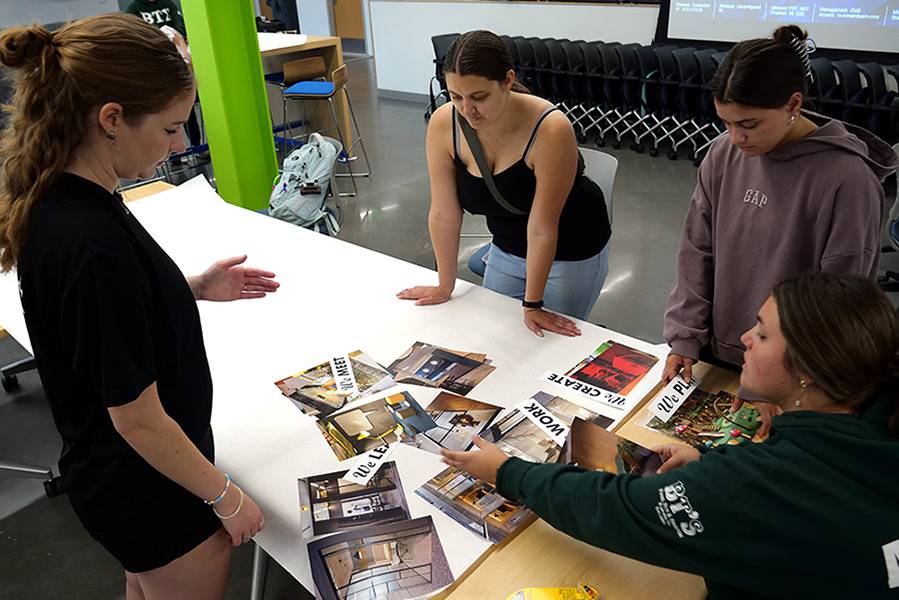
Senior interior design students at Radford University are lending their creative talents to the revitalization of the city’s east-side downtown corridor through a dynamic partnership with local developer Taylor Hollow Management.
Their contributions are part of course work for the Senior Studio II interior design class taught by Professor Laura Kimball. The course addresses hospitality, retail and restaurant design, capping years of building skills and problem-solving in designing residential and non-residential interiors.
In the past, projects were frequently rooted in theoretical spaces, but the City of Radford’s revitalization efforts offered the students real world spaces to work with, especially since the most recent endeavors have been on the east end of the city near the university.
The first student project was a proposal for a vacant restaurant space just off Main Street on Third Avenue. Their assignment was to propose a novel restaurant idea for the historic building with seating for up to 45 patrons and optional bar areas. Students developed comprehensive plans including branding, floor plans, lighting concepts, and accessibility solutions.
Students were required to support their ideas with research as well, and analyzed market gaps, local competition, and the city's diverse user groups. The space had to offer something for students, families, visitors and perhaps most importantly, the town’s year-round residents.
Final proposals were then shared with the property management team at Taylor Hollow, city stakeholders, and potential restaurateurs for review. In March, they received feedback from Sam Fortier, Project Manager for Taylor Hollow.
Fortier also took the students on a walk-through of their next space at 1095 East Main Street, a large building that has had many incarnations over the years. Here they had a unique set of circumstances that would affect how they approached the problem.
After students toured the facilities and gained a sense of the space, they returned to the classroom and began brainstorming in teams to develop possibilities. Then, on April 29, they brought their ideas forward to developers and business leaders in Radford.
One team proposed a multi-use collaborative workspace patterned on the WeWork model. In this vision, clients could rent out studios, offices, studios and conference areas while having onsite daycare for play and learning.
Senior Maddison Kunkel’s group presented two proposals, one for a children’s theater and an alternative for a children’s museum. Their group noted the current lack of theater arts opportunities for youngsters in Radford and argued that such a facility would not only provide creative outlets but social benefits as well.
“Empty spaces make a city look derelict,” Kimball explained. “So, this is a way to envision possibilities for some of the empty storefronts to create a space that is welcoming and exciting for the community and the students.”
Mackenzie Wallace calls Radford home
Mackenzie Wallace, M.S. ’25, credits Radford University and the Radford Tuition Promise for making education accessible and meaningful. Drawn in by opportunity and community, she’s built a new life in Radford, alongside her sisters, in a place that feels like home.
Community engagement for shared success
Artis Center opens doors to community
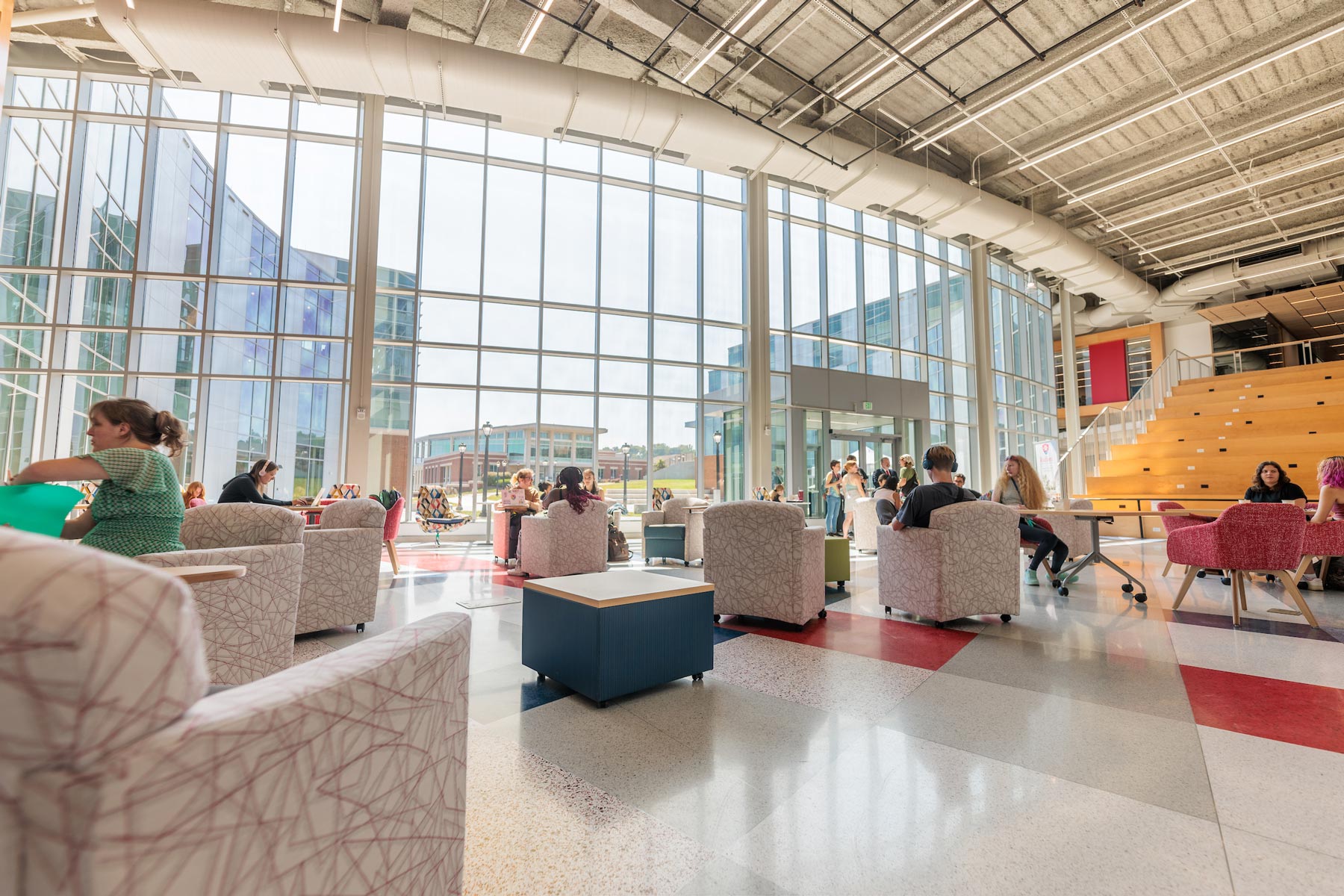
The Artis Center for Adaptive Innovation and Creativity is a multi-functional, cross-disciplinary space designed to bring the arts alive, integrate learning and research, and serve the broader community. At 178,000 square feet, it is the largest academic building on campus, as well as the largest construction project in the history of Radford University.
The Artis Center serves as the new home for the College of Visual and Performing Arts and provides unique learning and collaboration spaces for students in the Waldron College of Health and Human Services and the College of Nursing.
The Artis Center features performance and exhibit areas, hands-on learning spaces; flexible, high-tech classrooms; and that local organizations, community members and K-12 school groups can rent for events, gatherings and performances.
Two Artis Center-based clinics serve key community health needs. The Radford University Speech-Language-Hearing Clinic is proud to be a part of the RiteCare Childhood Language Program. With funding provided by the Scottish Rite Masons, Radford University provides specialized summer programs to preschool and school age children with language disorders. The Radford University Brain Injury (RUBI) Center provides comprehensive cognitive-communication speech language pathology services to a medically underserved population in the New River Valley.
Harnessing music to build community
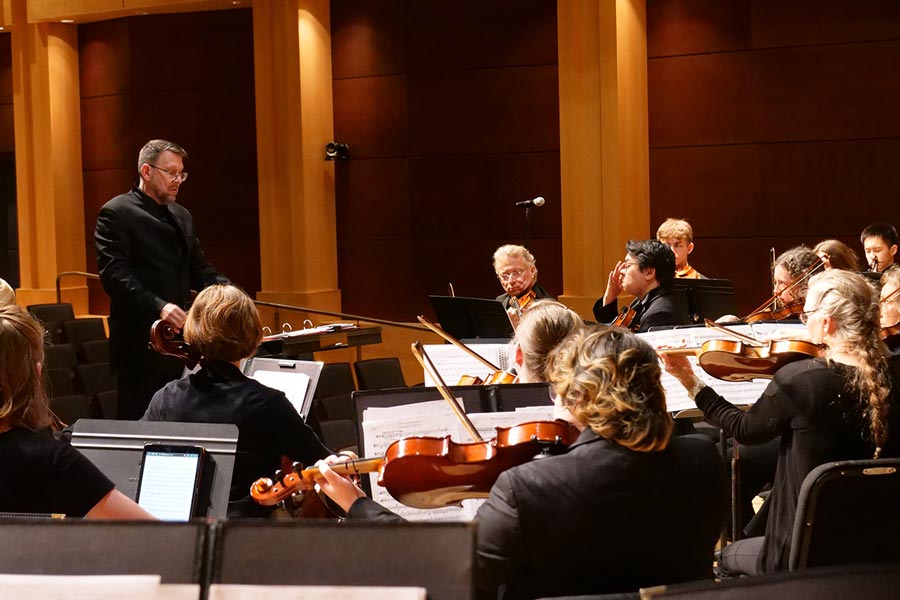
Radford University is committed to building successful partnerships throughout the New
River Valley and beyond. Cultivating a strong sense of community with individuals and organizations beyond our campus boundaries — in collaborative places and virtual spaces — is key to this effort.
When Radford’s Department of Music Chair Wayne Gallops began assembling Radford’s University Community Symphony three years ago, he didn’t know if the effort would gain traction. He simply felt that such an ensemble would have value for the department and for students and recruitment and would be beneficial for area musicians, as well as local fans of the classics.
“For a university of our size and a department of our scope, it’s rare not to have a symphony,” Gallops explained. So, in late 2022, he got to work recruiting players.
“It surprised me how quickly it took off,” he said.
“Immediately, we had enough of a core for a symphony. And then it got big.”
The group’s numbers have since risen to more than 70, comprising university students, faculty members, alumni, retirees, high schoolers and others, forming a web that spreads out from the campus to include Blacksburg, Roanoke, Giles County and beyond. A Wytheville, Virginia, mother and her two sons are members, as is a woman in her 80s from rural Riner, while a teen who plays the French horn commutes from North Carolina to take part.
The spring concert included performances of “The Light Cavalry: Overture” by Franz von Suppé and Joseph Curiale’s “The Awakening.”
“The folks are very conscientious because they’re dedicating their time to this,” Gallops said. “They don’t have to be there. They’re coming, they get the music, and they practice it.”
Those efforts are paying dividends: In November, the University Community Symphony took the stage in the Douglas and Beatrice Covington Center for Visual and Performing Arts to a capacity crowd of about 350.
“Here’s what surprised me: Before the concert, I went out to my car ... and people were starting to arrive, and there was this whole group of high school kids coming in,” Gallops said.
They weren’t from Radford, he felt, or he would’ve recognized them, which suggests they traveled some distance to the campus, to hear classical music no less.
“That was kind of a surprise,” Gallops recalled. “I knew we were going to attract people from the community, but just to see it in that specific way was kind of cool.”
The University Community Symphony is just one
of countless partnerships Radford has forged with surrounding communities and organizations -- in fields ranging from nutrition and social work, to tax preparation and community service.
Highlander pride reaches across New River Valley, nation
With a legacy of success between the lines and in the classroom, and a platform for national exposure, Highlander athletics serves as the “front porch” for Radford University.
Since 2010, Highlander programs have made 24 team and individual appearances in NCAA Division I championships, and have won 65 Big South regular season, tournament, or individual titles.
Radford teams and student-athletes regularly capture the attention of national audiences with viral social media moments, victories over nationally ranked opponents, and influence on key issues in intercollegiate sports. During the 2024-25 season, the Radford men’s basketball team was twice added to the Big South’s national linear television package on ESPNU, including a 77-53 win over defending league champion UNC Asheville at the Dedmon Center on Feb. 20.
In 2023-24, Radford University was awarded the Big South Presidential Honor Roll championship, as 86% of Highlander student-athletes earned a 3.0 GPA or better during the academic year – an all-time high in the conference’s 42-year history.
Highlander teams are scheduled to host 102 home contests in 2024-25, attracting an estimated 40,000-50,000 fans. Home basketball games (men’s and women’s) included community promotions like Educator Appreciation Day, Little Highlanders Day, Hoops for Hunger benefiting Bobcat Backpacks, and a “Teddy Bear Toss” benefiting Carilion Children’s Hospital.
University visitor spending, of which athletic events are a major contributor, is worth more than $7.1 million to the region, according to the 2022 Economic Impact Study.
Increased enrollment, retention builds foundation for shared success
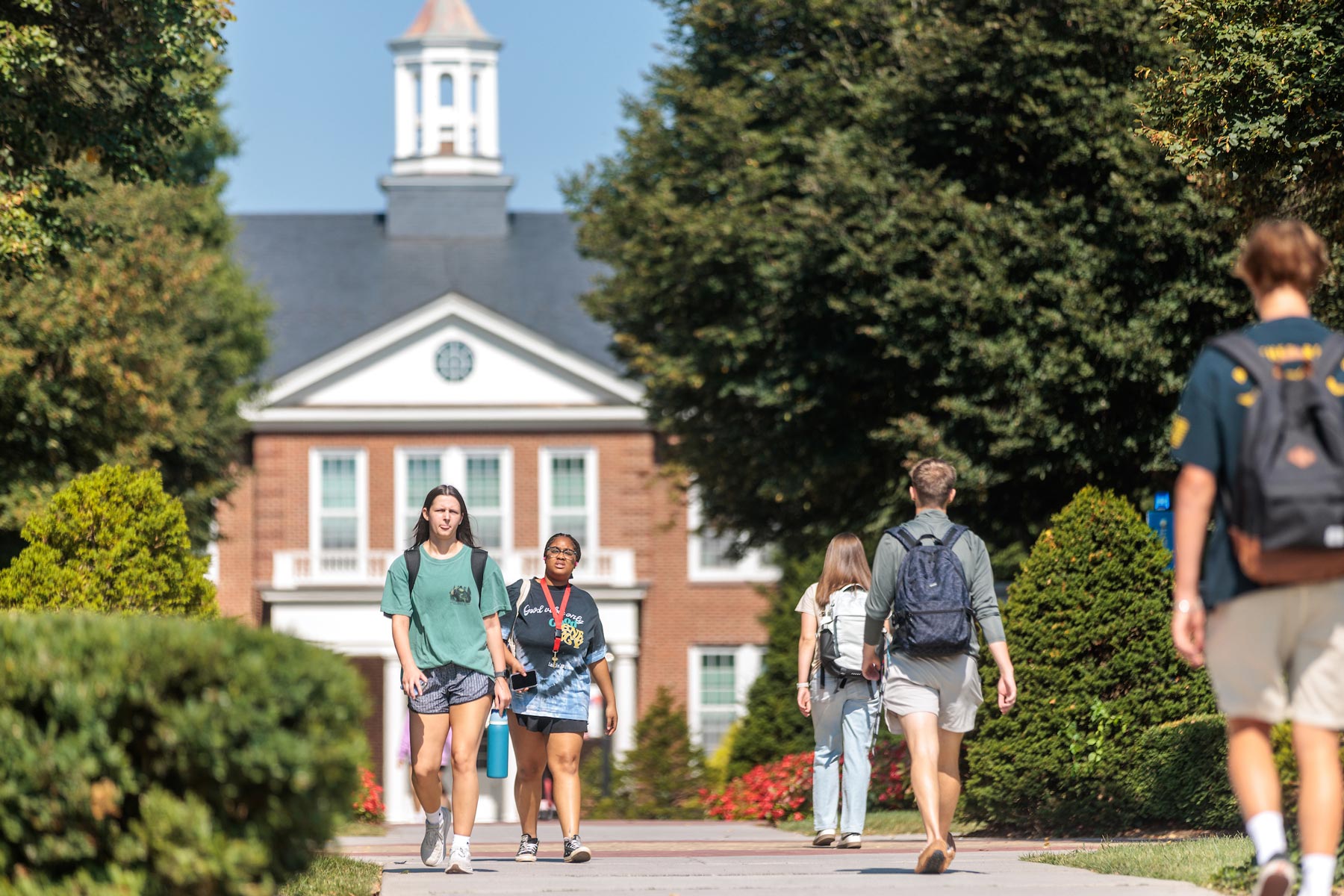
Despite obstacles that include downward trends in nationwide higher education enrollment, federal financial aid form difficulties and a five-year decline in the university’s overall student population, Radford saw significant growth in both its enrollment and retention figures in the 2024-25 academic year.
Overall university enrollment grew by 3.7% from fall 2023 to fall 2024, including an additional 295 full-time students on the main campus in Radford. Local student enrollment was a contributing factor, including 166% growth from Radford City Schools. In February, the university reported a spring retention rate and a fall graduation rate of 94%, Radford’s highest rate since 2018. Pell grant recipients, who make up more than 40% of the university’s undergraduate student population, were retained at 90% - the highest rate in 15 years.
Several key access and affordability initiatives have made a Radford University degree more attainable than ever. Benefits from the Radford Tuition Promise, which covers tuition costs for Virginians with a family Adjusted Gross Income (AGI) of $100,000 or less, were extended to over 2,200 students this fall. Direct Admission, introduced for qualified students, simplified the application process for the incoming class. These efforts helped Radford University achieve its highest percentage of year-over-year new student growth (freshmen and transfers) since 1975.
Tartan Transfer, introduced in November, opens new doors for students who enroll at one of eight Virginia Community College System institutions in Western Virginia. Students who declare for Tartan Transfer enjoy personalized Radford advising benefits as well as pre-enrollment access to university events, support services, and organizations.
Additional enrollment boosts Southwest Virginia’s economic outlook. The Radford University Economic Impact Study 2022 reported that students had a statewide annual impact of $85.7 million in 2022, with 94% of spending occurring in the immediate region surrounding the university’s in-person locations.
A place for civic engagement, constructive conversations
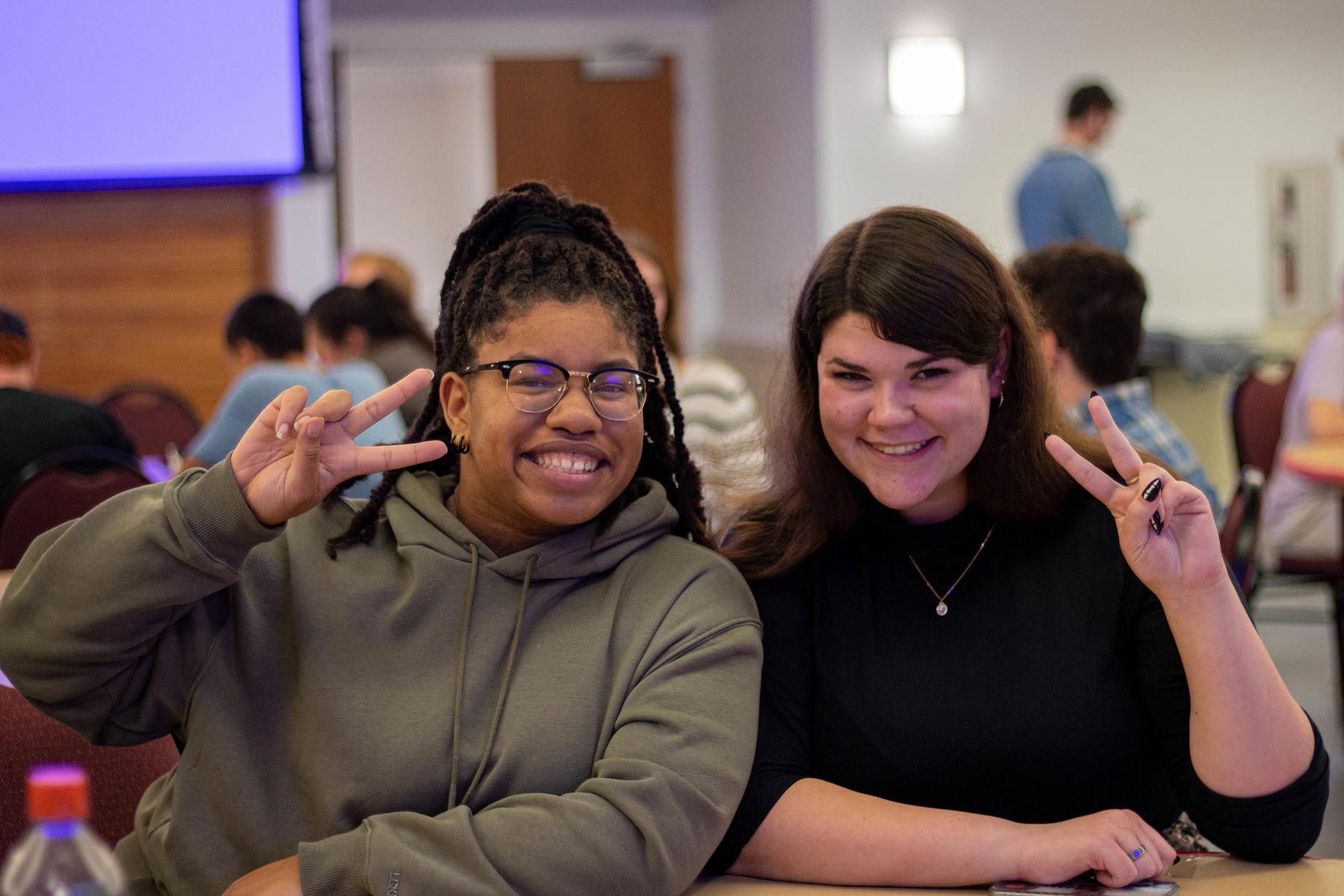
On Wednesday Nov. 6, following the 2024 U.S. Presidential Election, readers of the Roanoke Times were greeted with a front-page story about the student-led “Highlanders Vote: Road to the Ballot Box” program. A two-day series of panels, conversations and activities began Nov. 4 and culminated in a block party and a live watch of the election returns on Nov. 5.
“We wanted to make sure students understood not only how to vote but also the importance of their vote in shaping the future,” said MacKenzie Wallace, a graduate student in Radford’s Strategic Communications program.
“Highlanders Vote” is one example of the university’s commitment to amplifying student voices across the political spectrum, while developing leadership skills.
In the summer of 2024, Radford hosted students from Georgetown University at Selu Conservancy for “Power of Dialogue: Deconstructing the Rural-Urban Divide,” designed to develop the cultural dexterity needed to serve as a bridge between urban and rural communities.
In March, Radford earned a Voter Friendly Campus designation from the Campus Vote Project, which celebrated the university’s efforts to “break down barriers and empower students with the information and tools they need to participate in the political process … and open the door to lifelong civic engagement for students.”
Branding invites students, employees, community to “Find Your Place. Here.”
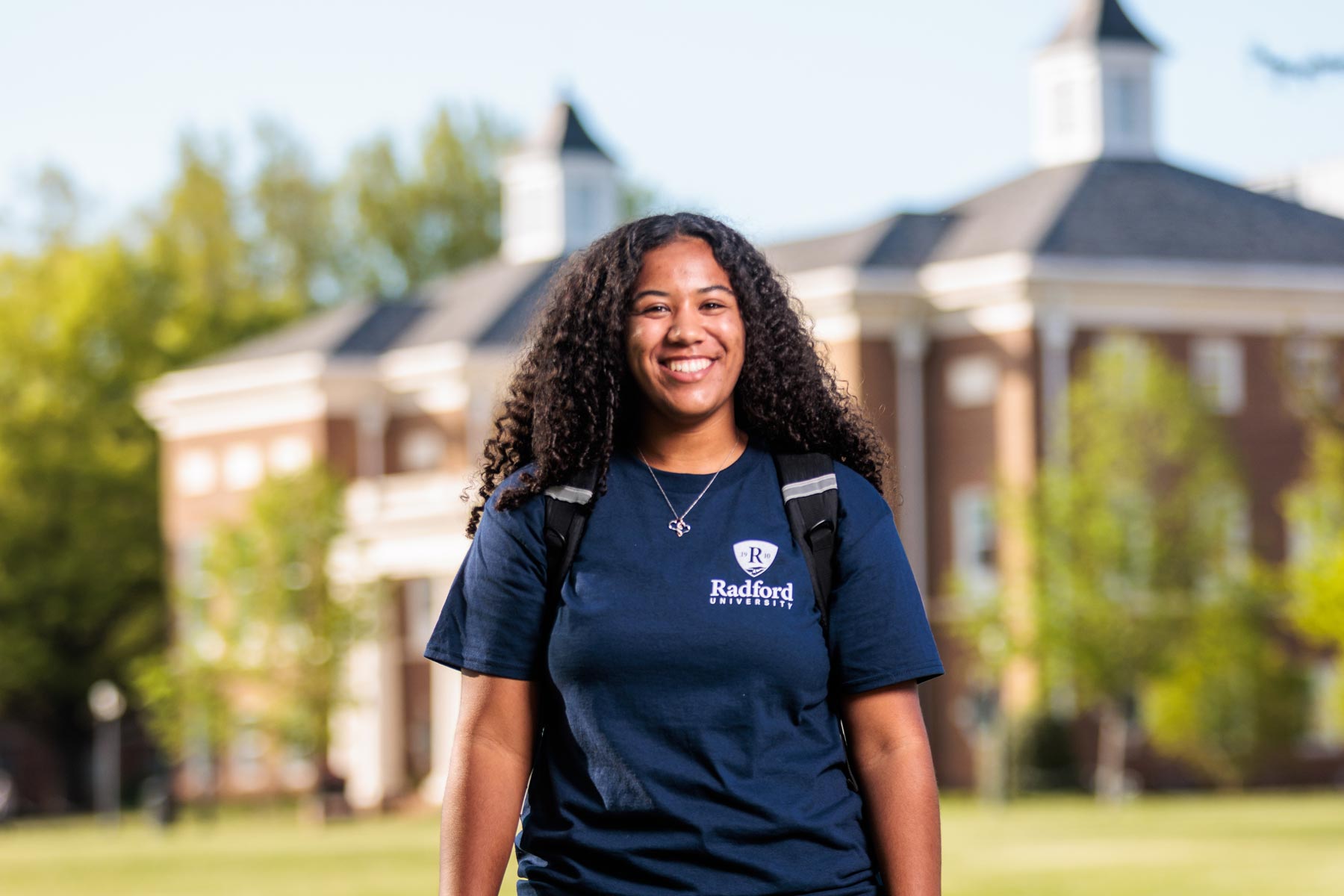
In the fall of 2023, Radford University relaunched a new brand that encompasses a new logo, color palette, typography, and graphic elements, along with new brand personality traits, pillar messages and a campaign tagline.
The six brand personality traits include Kind, Genuine and Inclusive. Living these traits helps bring our culture of care to life in authentic and powerful ways. The tagline — Find Your Place. Here. — is a call to action for employees, challenging them to:
- Welcome each individual as a valued member of our community.
- Ensure that everyone enjoys access to our resources,
- Honor cultural differences while celebrating shared values, and
- Invite every voice into conversation ... and listen with the intent to learn.
It is also designed to encourage students, employees, alumni, community members and visitors to find their passion and achieve their potential by exploring the many clubs, activities, people, programs and resources at Radford.
